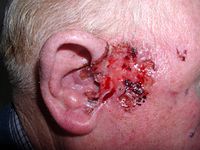
Photo from wikipedia
Abstract Umbelliferone exhibits extensive pharmacological activity, including anti-immunomodulatory, anti-inflammatory and antigenotoxicity activities. However, its antitumor properties still remain unclear in human renal cell carcinoma (RCC) cells. Our results have revealed… Click to show full abstract
Abstract Umbelliferone exhibits extensive pharmacological activity, including anti-immunomodulatory, anti-inflammatory and antigenotoxicity activities. However, its antitumor properties still remain unclear in human renal cell carcinoma (RCC) cells. Our results have revealed that treatment of human RCC cells (786-O, OS-RC-2, and ACHN) with umbelliferone reduced cell proliferation in a concentration-dependent manner and induced dose-dependent apoptotic events. In addition, cell cycle analysis determined that umbelliferone treatment induced cell cycle arrest in the G1 phase in a dose-dependent manner. Furthermore, western blotting analysis showed a dose-dependent decrease in Ki67, MCM2, Bcl-2, CDK2, CyclinE1, CDK4, and CyclinD1 and a dose-dependent increase in Bax in RCC cells cultured with umbelliferone. Similarly, umbelliferone exhibited a dose-dependent reduction of p110γ when using western blotting analyses. Taken together, these results provide an insight into the pharmacology regarding the potential application of umbelliferone, which contributes to cell death by decreasing p110γ protein expression.
Journal Title: Acta Pharmaceutica
Year Published: 2019
Link to full text (if available)
Share on Social Media: Sign Up to like & get
recommendations!